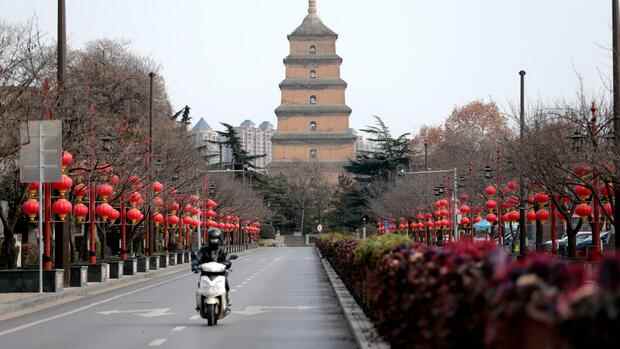Business interruptions as a result of the lockdown are a disaster for chipmakers.
(Photo: VIA REUTERS)
Düsseldorf, Munich Chips have been in short supply worldwide for months. Now the situation is getting worse: Because of the corona-related lockdown, Samsung has to restrict production in two chip factories in the Chinese metropolis in Xi’an. The world’s largest manufacturer of memory chips announced this Wednesday. It remains unclear how much the company from South Korea is shutting down production.
A strict curfew has been in effect in the metropolis since last Friday to combat a Covid outbreak. It is the largest lockdown in China since the first corona pandemic outbreak in Wuhan in 2020. Authorities have found more than 900 Covid infections in mass tests within three weeks. The city, an important center for semiconductor, aerospace and other high-tech industries, has been largely cordoned off. There is still no information on how long the disease control measures will apply. In Wuhan, the lockdown lasted 76 days.
Chip manufacturing is a highly complex process. A complete standstill in production, even for a short time, could lead to delivery delays lasting for weeks. And Samsung isn’t the only major semiconductor manufacturer producing in Xi’an. US rival Micron also operates a plant there. Micron is number three among memory chip manufacturers. The Americans have so far not commented on the effects of the lockdown in the metropolis.
The customers, however, are alarmed: “Xi’an is an important location for the semiconductor industry. This is likely to aggravate the already very tense global supply chains, should the lockdown drag on ”, says Jens Hildebrandt, executive board member of the German Chamber of Commerce in China (AHK).
Top jobs of the day
Find the best jobs now and
be notified by email.
According to market observers, around 15 percent of all memory chips from Samsung come from Xi’an. In the case of the so-called NAND chips, the location even represents a good 40 percent of the Group’s capacities.
Business interruptions are a catastrophe for chip manufacturers
This year chip factories were shut down several times around the world. In the past few weeks, some manufacturers had to interrupt their production in Malaysia due to the pandemic. In February, a winter storm in Texas had brought the factories to a standstill, and in the spring a fire at the Japanese manufacturer Renesas caused significant downtimes. In autumn, a power outage in Dresden resulted in restrictions at the Dax group Infineon.
The interruptions are a disaster. Because the manufacturers cannot deliver as much as the customers order anyway. On average, customers currently have to wait a good five months before receiving the components. The industry association World Semiconductor Trade Statistics is expecting global sales growth of a good quarter to $ 553 billion.
Sales of memory chips, such as those produced by Samsung and Micron, increased particularly strongly by almost 35 percent in 2021. This was not least due to the fact that the companies were able to deliver enough – in contrast to corporations that offer other types of components. There are two types of memory chips: NAND chips store data even when the device is switched off, whereas DRAM is pure working memory.
So-called microcontrollers in particular are currently in short supply. Meanwhile, Samsung has assured that it will replace any failures in Xi’an with goods from other plants if possible. The South Koreans employ 3,300 people in Xi’an and have invested around 8.8 billion euros in the facilities there.
In addition to the semiconductor manufacturers Samsung and Micron, corporations such as the electric car manufacturer BYD and IT equipment supplier Huawei have large plants in Xi’an. German companies such as Bosch and Siemens also produce on site. In the meantime, reports of production downtimes are increasing.
BYD announced last week that it would cut back on-site production due to the lockdown. In addition, Xi’an is an important transport hub, with a busy freight train connection to Germany. Even before the lockdown, disinfection measures resulted in container jams.
China has a strict zero-covid strategy. Even in individual corona cases, entire apartment blocks are cordoned off and quarantined. In this way, the People’s Republic has long managed to contain the epidemic to a large extent. But since the travel month of October, China has been fighting with local outbreaks in various provinces, each of which reacts with hard lockdowns. The country’s economy is also increasingly suffering from this.
A greater concern than the economic impairment for the Chinese authorities is currently likely to be the avoidance of major Covid outbreaks in the run-up to the Winter Olympics, which start in February, says AHK manager Hildebrandt.
More: “Meeting rooms become dormitories”: Lockdown in the metropolis of Xi’an is slowing down German companies
